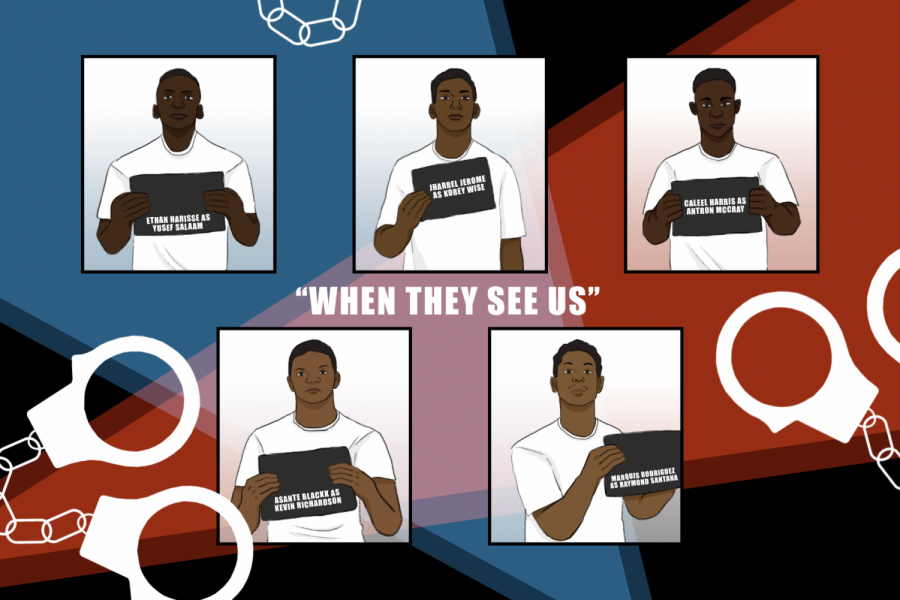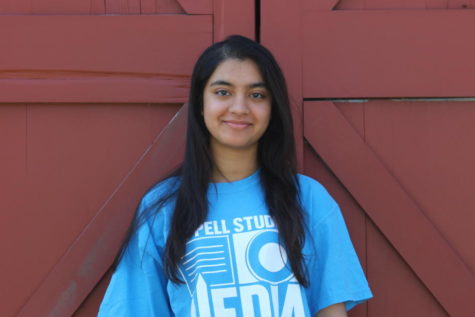When They See Us: Story of the incarceration of innocent boys
Central Park Five fights against injustice
In 1989, five teens that came to be known as the Central Park Five were wrongly convicted of raping a 28-year old woman named Trisha Meili. The Netflix series, “When They See Us” details the boys’ unjustified conviction and how the truths of the case were uncovered.
February 28, 2020
After casually scrolling through Netflix and deciding to watch a new show recommended to me, I did not expect to become an emotional wreck the next day after binge watching it.
The four-part limited series, “When They See Us”, debuted on May 31 on Netflix. The Emmy award-winning show is based on the true story of the famous Central Park jogger case where a woman jogger was assaulted and raped in New York’s Central Park in 1989.
Five teens, four black and one Hispanic, known as the Central Park 5 – Yusef Salaam, Kevin Richardson, Antron McCray, Korey Wise, Raymond Santana – were only 14-16 years old at the time when they were wrongfully convicted on the accounts of attempted murder, rape, assault and robbery.
They were found guilty despite the lack of solid evidence linking them to the crime, serving 6-14 years in prison until they were finally exonerated in 2002. Their truth was locked away with them as children, only to come out when they became adults.
The show’s four episodes touch on police aggression, flawed court system, difficult transition during parole, life behind bars as well as the repercussions on their family.
“I felt a deep sadness for their kids and moms,” CHS ASL teacher Delosha Payne said. “I’m a mom of black children so I could identify.”
The line that brought my emotions to the brink is when two of the boys are in a holding cell and Richardson asks, “Why are they doing us like this?” Santana responded saying, “What other way they ever do us?”
This story is not simply an isolated incident from 1989; it represents a bigger injustice – the issue of police brutality and struggles of the criminal justice system for the African-American community. The fact that it continues today makes me even more heartbroken.
“This series invites people to think about all the millions of cases that are not dissimilar from what you’ll see in ‘When They See Us,” said writer and producer Ava Duvernay on the series’s Instagram and Twitter.
In fact, black people are three times more likely to be killed by the police than white people, and are incarcerated at more than five times the rate of whites. This statistic is highlighted in the headlines of specific incidences such as Eric Garner to the overall Black Lives Matter movement. This issue has grown so much that many African Americans are raised to know how to act around police to not be seen as ‘suspicious.’
“A lot of times it seems as if your skin is a weapon,” Coppell High School senior Rodney McCarty said. “Through most of my childhood, intermittently, my mom would talk to me about what to do and what not to do whenever talking to a police officer. [She] has even taken me to the courthouse multiple times to tell me what to do and what not to do in certain situations in order to help me not get in trouble.”
The safety and justice police officers and judges offer does not seem to extend to African-Americans. It seems the mentality is that African-Americans are the ones we need safety from, pinning them to more criminal activity.
“The criminal justice system says that you’re innocent until proven guilty,” Salaam, one of the exonerated men, said in an interview. “But if you’re black or brown, you are guilty and have to prove yourself innocent.”
The false narrative that raised suspicion of the boys was merely skin deep.
“As black people, we have our own swagger in the way we talk, in the way we walk, the passion we have, when we are standing up for something we believe in. Often times it gets confused for aggression,” Payne said.
This show is painful to watch, no doubt. It is a show that left me in part disbelief and part anger. They were expected to grow up, not get locked up. But it is a necessary watch, because it helped me gain insight on the struggle. Their story, along with all the other uncovered stories out there, deserves to be known.
The series is named “When They See Us” because it allows the wrongfully convicted to finally be seen as innocent.
Now the question is: when will they stop?
Follow Alishba Javaid (@alishbaj24) and @CHSCampusNews on Twitter.













nanette • Mar 2, 2020 at 10:09 am
I love this story. this is one of my favorite Netflix show because its so real even in today’s society. glad you were able to shed light on this issue!